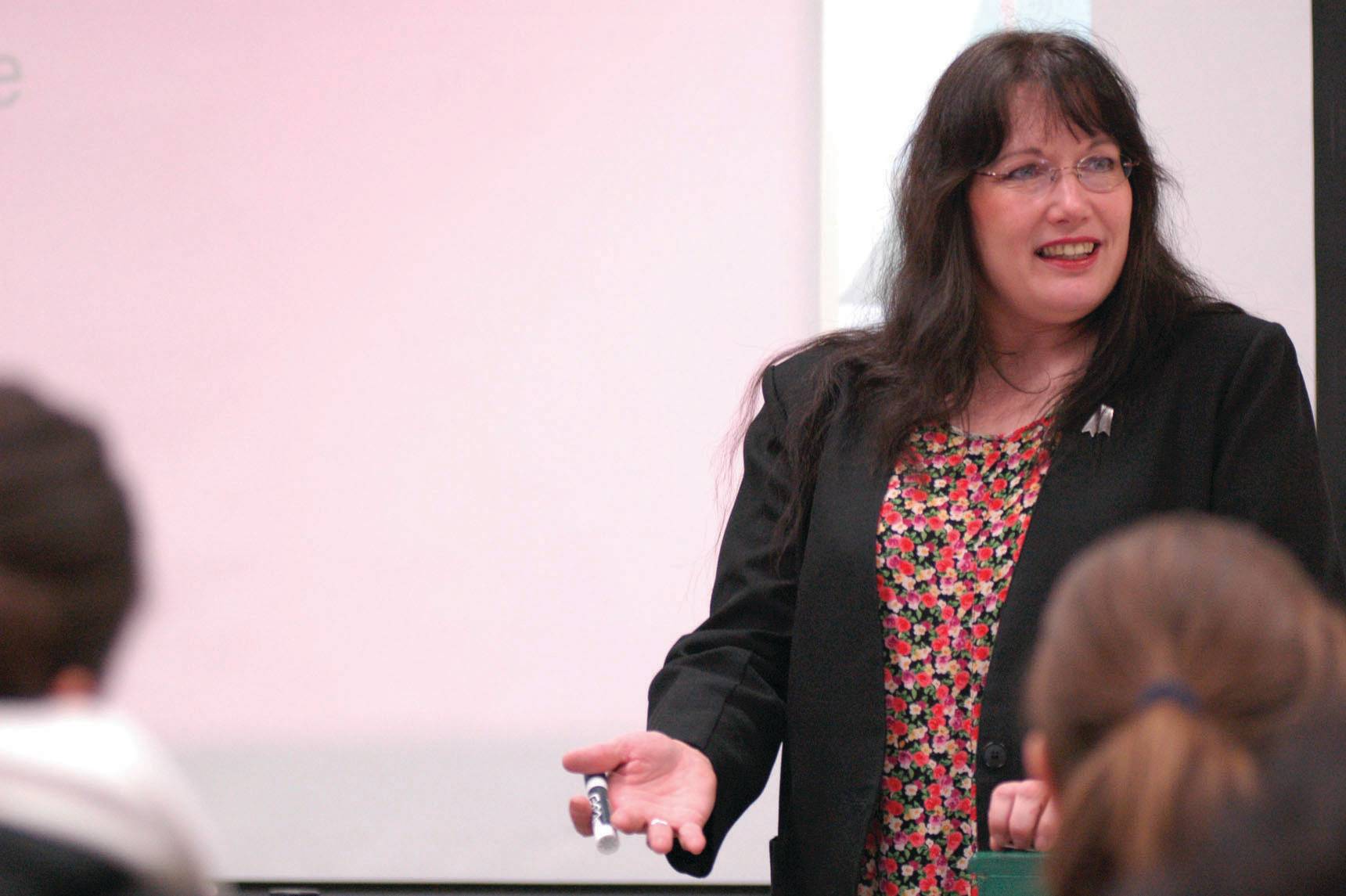Mechanics of the Mind
COCC’s psychology program offers an immersive learning environment to take students to the next level
Travis Bickle likely suffered from a misdiagnosis. That’s the character played by
Robert De Niro in “Taxi Driver,” whose mental state is the topic of a discussion in
an evening “Abnormal Psychology” class at Central Oregon Community College. Rebecca
Walker-Sands, Ph.D., uses a clip from the classic film to discuss behavioral disorders,
putting schizophrenia in the spotlight.
“He wanted to have relationships,” she said to the class, pointing out the discrepancy
of the diagnosis. “He should have been diagnosed as schizotypal—it’s like schizophrenia
‘light.’” The evening lecture on personality disorders features slides of brain scans,
pop culture references and a few personal anecdotes—the professor has a knack for
mining stories for detail. It’s a memorable presentation of science and story, with
complex material delivered in an approachable way.
At COCC, the psychology program offers a diverse body of curriculum. Studies range from human sexuality and behavioral
ecology to prejudice and mob mentality. And the material comes with diverse perspectives.
“One of the things we pride ourselves on is that we’re three very, very different
kinds of psychologists,” said Matthew Novak, Ph.D., from his Bend campus office (where
the primate-themed décor hints at his former life with the National Institutes of
Health).
In all, there are seven faculty members in the busy department. Students can earn an Associate of Arts Oregon Transfer degree with a psychology focus, equipping them for continued learning at any of Oregon’s public universities. That was Wendi Forsberg’s path. She furthered her studies at OSU-Cascades and now works with dementia patients at a Bend retirement facility to keep them engaged, present and happy.
“I love my job,” she said. “I didn’t know this would be the population that I would fall in love with, but there it is,” she said. “The experiences, professors and the friends that I made through the psych department helped change the path that I was on—I found the professors extremely invested in their students’ success.”
“The fact that we get from Point A to Point B in three entirely different ways, I think adds value and robustness.” His own specialty—in developmental psychology—works together with the specialties (biological and social psychology) of his full-time professor colleagues to create an in-depth, well-rounded program.
That investment manifests both inside and outside the lecture hall. In fact, there’s
a thriving culture of applied, active learning in the program that inspires and enables
students to make the most of their experience. It’s a collegial environment built
on open-mindedness, collaboration and community.
Opportunities include things like conferences, project showcases and research training.
A club called Central Oregon Psychology Enthusiasts, or “COPE,” is a mainstay for many, a way to share learning and discussion through
social events with a broad network of students (even alumni).
There are movie nights and guest lectures. There’s even a field study partnership
opportunity, managed by the University of Washington, where students can dive into
a different culture while staying on an island in the Indian Ocean: they practice
research techniques and study content relevant to fields like conservation psychology.
Up-and-coming researchers can participate in the Collaborative Replications and Education
Project (CREP), a crowdsourced venture that challenges undergraduates to rerun much-cited
psychology research. They examine their own conclusions against original findings,
putting published work to the test. This past year, a group from the college attended
the Western Psychology Conference and presented their research during the poster session—one
of few community colleges invited to do so.
“We’re trying to build this experience where it immerses them,” said Andria Woodell,
Ph.D., on an afternoon when she was helping students set up for an academic showcase
event on the Bend campus. Research posters decorated the walls and students focused
on projects. In between questions from student volunteers—about extension cords, button-makers
and glitter—she described a program called the Heroic Imagination Project.
“When you look at a lot of the chaos that’s going on right now, with hate crimes going
up and the way people are talking to each other, the ‘us versus them’ dynamics, all
of that is social psychology,” Woodell explained. “If you can teach people the persuasion
tactics and the social influence that’s going on to create hatred, then maybe we can
counteract it.”
Designed by Stanford University’s Dr. Philip Zimbardo, and implemented in settings
worldwide, the project uses a standardized PowerPoint presentation to inspire ways
of ungluing bystander apathy when it comes to things like bullying and sexual harassment.
COCC students, who put their own imprint on the presentation—and gain some valuable
public speaking experience—have presented at a number of community venues.
“This is not a typical experience that one receives at a community college,” said
Katie Rutledge, a COCC grad, on the program’s plentiful learning outlets. “As a non-traditional
student, my goal was to get an associate degree while working part-time.” Her view
quickly expanded. Rutledge went on to lead a very involved student life, including
presenting work at three conferences and publishing an abstract.
Having recently completed her bachelor’s degree at the University of Oregon—minoring
in psychology—she’s now applying to graduate programs. Her ambition is to one day
teach at a community college.
For more details, visit the psychology program at Central Oregon Community College or call 541-383-7700.
By Mark Russell Johnson, COCC College Relations

